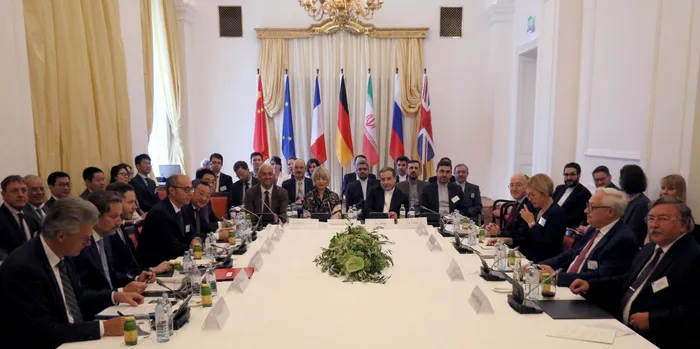WATCH: China blames US for Iran nuclear crisis

The European Union's political director Helga Schmid and Iran's deputy Foreign Minister Abbas Araghchi, center from left, wait for a bilateral meeting as part of the closed-door nuclear talks with Iran at a hotel in Vienna, Austria, Sunday, July 28, 2019. The European Union's political director Helga Schmid and Iran's deputy Foreign Minister Abbas Araghchi, center from left, wait for a bilateral meeting as part of the closed-door nuclear talks with Iran at a hotel in Vienna, Austria, Sunday, July 28, 2019.
After years of tension over Iran’s alleged efforts to develop a nuclear weapon, 2015 marked Iran’s long term deal on its nuclear programme. With the agreement being finalised in April 2015, it ended 12 years of crisis as well as 21 months of negotiations and consisted of the world powers; the US, the UK, France, China, Russia, and Germany.
The programme which came into force on January 16, 2016, paved the way for a partial lifting of international sanctions on Iran, opening doors for foreign investors. However, by limiting its nuclear activities in return for sanctions relief, the nuclear deal, in turn, restricts Iran’s enrichment of Uranium, which is used to make reactor fuel but also nuclear weapons.
China is Iran’s number one oil customer and trading partner; both countries foundations of their economic partnerships are showcased. They are thus resulting in their economic partnership being built on Iran’s access to energy resources and China’s growing needs for Iran’s energy resources. By having economic relations and having access to Iran’s energy resources with Iran, China believes that the US is to be blamed for Iran’s current nuclear crisis.
WATCH:
China blames US for Iran nuclear crisis, Belt and Road Television, BRItv, Mary-Jane Mphahele
At a press briefing in Beijing, Chinese Foreign Ministry spokesman, Geng Shuang also stated that “The facts show that unilateral bullying has already become a worsening tumour." Following US President Donald Trump’s decision to withdraw from Iran’s nuclear deal. Therefore increasing China’s belief that the US is the reason behind the escalating Iran nuclear crisis. With the US pulling out of the nuclear deal, Iran then went on to threaten to abandon commitments to the 2015 nuclear deal unless the remaining parties can find a solution.
In August 2018, Washington started reimposing sanctions which target social sectors. This includes oil experts, the banking system, and fuelling a recession. However, Iran gave a 60-day deadline instead to the other signatories to protect it from the US sanctions. Tehran’s start in enriching Uranium above the set limit has resulted in the opposition countries backing the nuclear deal, with Germany urging it to “reverse all activities inconsistent with its commitments.” However, until Iran achieves “full rights” to an economic relationship with Europe under the deal, Iran also states that it will not reverse the decision to Increase Uranium enrichment.
A senior security official and representative of Iran’s supreme leader, Ali Shamkanis' warning also suggests that France, Germany and the UK will struggle to keep the nuclear deal alive. Despite Trump’s threats to crank up sanctions and accusing Iran of “secretly” enriching their Uranium limit, European leaders have noted that they will not rush to penalise Iran. However, EU leaders will find it increasingly difficult to resist the pressure from Trump’s administration.